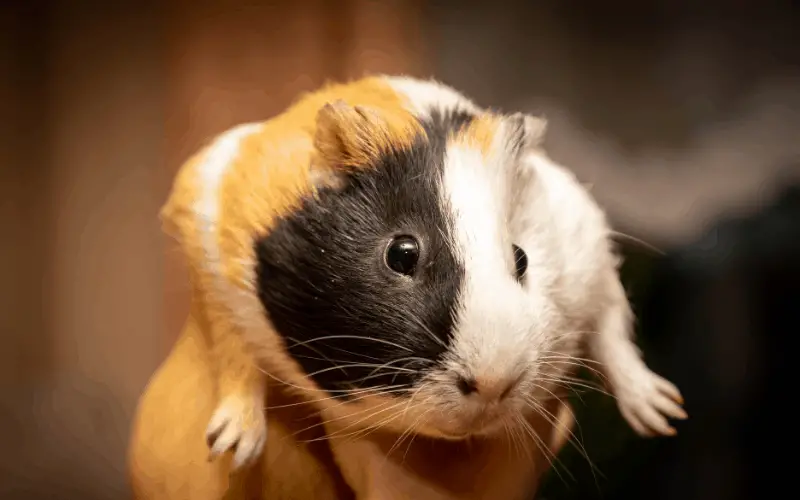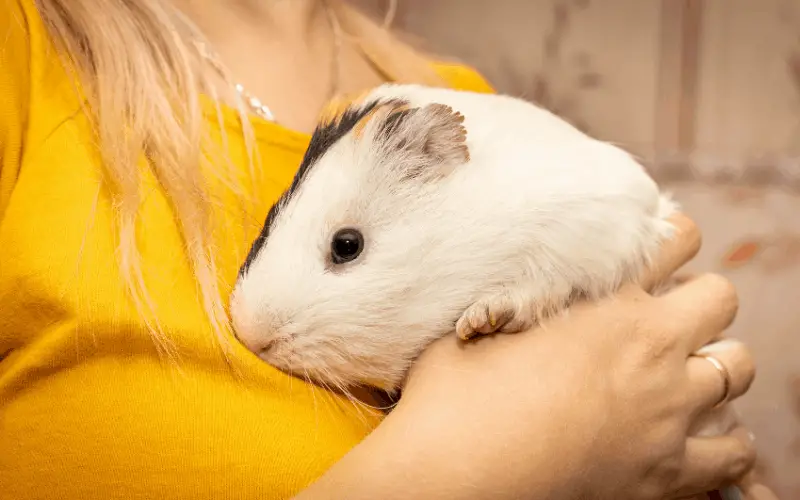How long do guinea pigs live? To put succinctly, guinea pigs have an average lifespan of 4 to 8 years. While losing a pet you love so much isn’t something anyone will ever wish for, it’s also a sad reality that we have to come to terms with.
But instead of this to be something to brood over, knowing how long guinea pigs live will give you an estimate of how much time you’ve got with your little furry friend. This way, you get to make the most out of every second.
That said, there are a couple of factors that affect the lifespan of a guinea pig, which we will be discussing shortly. Let’s get started!
How Long Do Guinea Pigs Live?
Guinea pigs, also known as cavies, are a domesticated species of rodents (Cavia porcellus), which was originally native to South America.
Although they were first popular for thousands of years as food, people have taken these little furries into liking, and guinea pigs are now known as pets, and this species no longer exists in the wild.
Although the average lifespan of a guinea pig is 4-8 years, there are a couple of factors that can increase or reduce that number, which we will look at below:
Factors That Affect Guinea Pig Lifespan

1. Domesticated Or Wild
Although there are only a few numbers of wild guinea pigs, they have a shorter lifespan compared to domesticated guinea pigs.
This is due to the multitude of dangers they are exposed to in the wild; from Predators like coyotes and wolves to harsh weather conditions, wild guinea pigs have a lifespan of 1-4 years.
Domesticated guinea pigs, however, with the right care, can live up to 8 years.
2. Breed
This is a very important factor that determines your guinea pig’s lifespan. There are different breeds of guinea pigs, and the different genes play a role here.
3. The Hairless Breed
These are skinny guinea pigs with a shorter lifespan; this is because of their hairless skin that makes them prone to skin infections.
Examples of this breed include skinny guinea pigs with a lifespan of five years and Baldwin guinea pigs with a lifespan of six years.
4. Short-Hair Breed
As the name implies, this breed has short hair, and examples include American guinea pigs with a lifespan of five to seven years and Himalayan guinea pigs with the same life expectancy.
5. Rough-Coated Breeds
Examples of this breed include Abyssinian guinea pigs, which is a breed that loves human companionship with a lifespan of five to seven years.
Cuy guinea pigs are quite challenging to tame, with a lifespan of four to eight years.
Teddy guinea pigs have energetic and extroverted personalities with a lifespan of four to five years.
Sheba guinea pigs have a really rough coat due to the rosettes that stick out in different directions, with an average lifespan of four to seven years.
Rex guinea pigs have a sweet temperament with an average lifespan of five to six years.
6. Long-Haired Breed
Examples of this breed include Peruvian guinea pigs have distinctive long hair with an average lifespan of eight years.
Sheltie guinea pigs have silky hair, with an average lifespan of five to eight years.
Texel guinea pigs have really long hair that requires a lot of grooming, with an average lifespan of four to seven years.
7. Gender
Some studies do claim that male guinea pigs live longer than their female counterparts. The reason being that the females have to undergo pregnancy, which, when not monitored properly, can lead to life-threatening complications for the guinea pig.
The type of care a female guinea receives after birth also has a direct impact on its health. One of these complications is mastitis.
This is when the mother’s mammary glands become infected with bacteria causing the glands to swell. Without immediate attention and treatment, the bacteria can spread to its bloodstream, and this can be fatal.
8. Companionship
Guinea pigs are very social animals, and they love companionship; in fact, guinea pigs cannot survive alone. Without a companion, the guinea pig has no one to interact with or play with, and this can be depressing for them.
Loneliness can cause a guinea pig to lose its appetite and begin to chew its skin; this can lead to a weakened immune system and skin wounds which can become infected by bacteria.
10. Diet
You are what you eat! These words cannot be any truer for our furry little friends. The type of food and nutrition you provide for your guinea pig has an effect on its lifespan.
Guinea pigs are herbivores, so their diet should consist of high-quality grass hay, pelleted guinea pig food, and limited amounts and specific types of fresh vegetables and fresh fruit.
Not feeding your guinea pig the right balanced nutrition can cause chronic diarrhea, obesity, and diseases of the heart, liver, or kidneys.
There are various types of vegetables and fruits your guinea pig can and cannot eat, and you will find the list here.
You have to keep in mind that the diet for young guinea pigs differs from that of adults. Growing guinea pigs six months and younger should be fed a diet rich in calcium; for adults, this diet can cause a lot of health issues.
Also, guinea pigs cannot produce vitamin c, so it is up to you to provide a source of vitamin c for your piggy. There are various sources of vitamin c for guinea pigs, and you can find them here.
Read Also: Is Basil Good for Guinea Pigs?
11. Health Care
You need to have your guinea pig checked by a vet at least twice a year. This way, any underlining problem is quickly spotted and treated before it worsens.
You also need to check the weight of your guinea pig regularly. This is because weight is a big indicator of a guinea pig’s being.
The weight range of guinea pigs also depends on their gender. You can use a kitchen scale to measure your piggy to ensure that it isn’t gaining or losing too much weight, which is an indicator of underlying issues.
Here’s some common illness your guinea pig might experience
- Scurvy-when they don’t take in enough vitamin c
- Tumors which can be detected early with regular vet checkup.
- Urinary tract problem affects all guinea pig regardless of breed and needs to be treated immediately.
12. Enclosure
Where your pet’s stays have an impact on its wellbeing. The cage or enclosure your guinea pig is kept in should be up to 60cm wide, and if possible, it should be equipped with mental and physical stimulation toys.
Keeping the cage clean free of germs and other organisms that can make your pet sick is also very important.
Conclusion
How long do guinea pigs live? Well, I believe you have the answer now. Although we cannot prevent our beloved pet from crossing the rainbow bridge but knowing the lifespan of your guinea pig will help you to make the most out of the time you’ve got.
